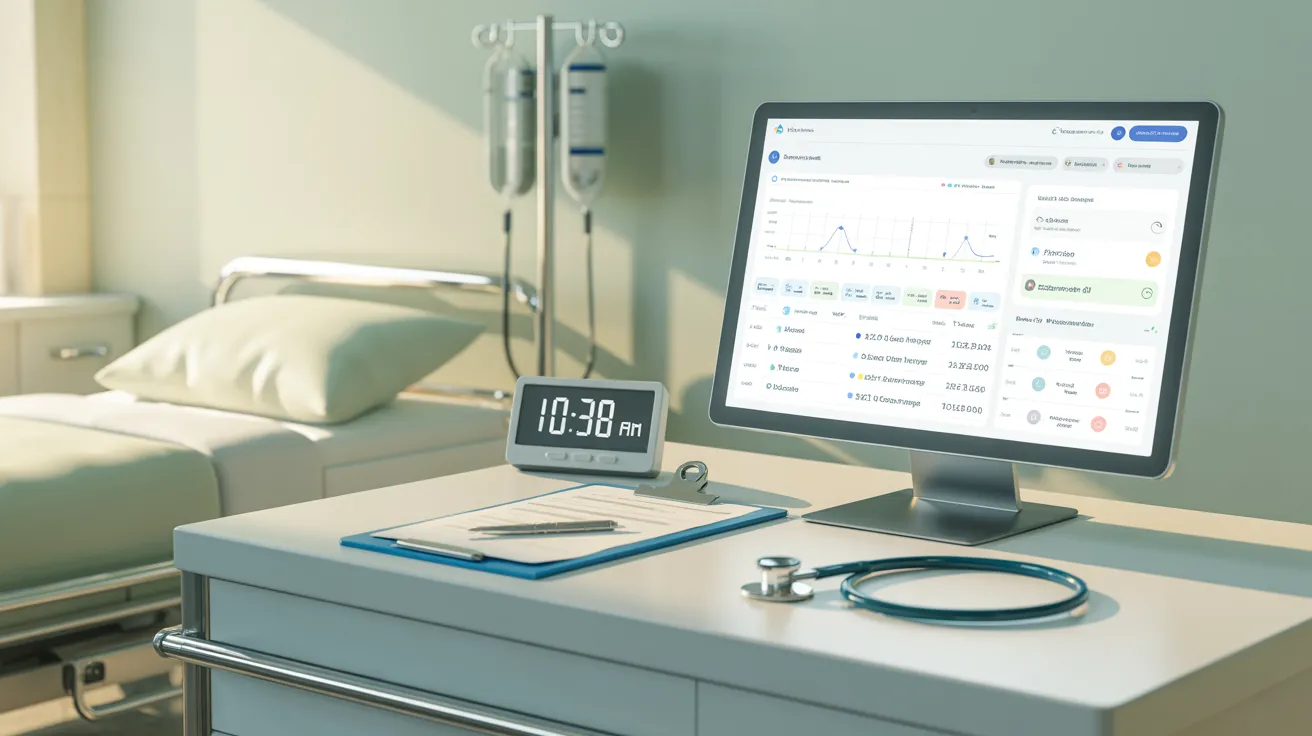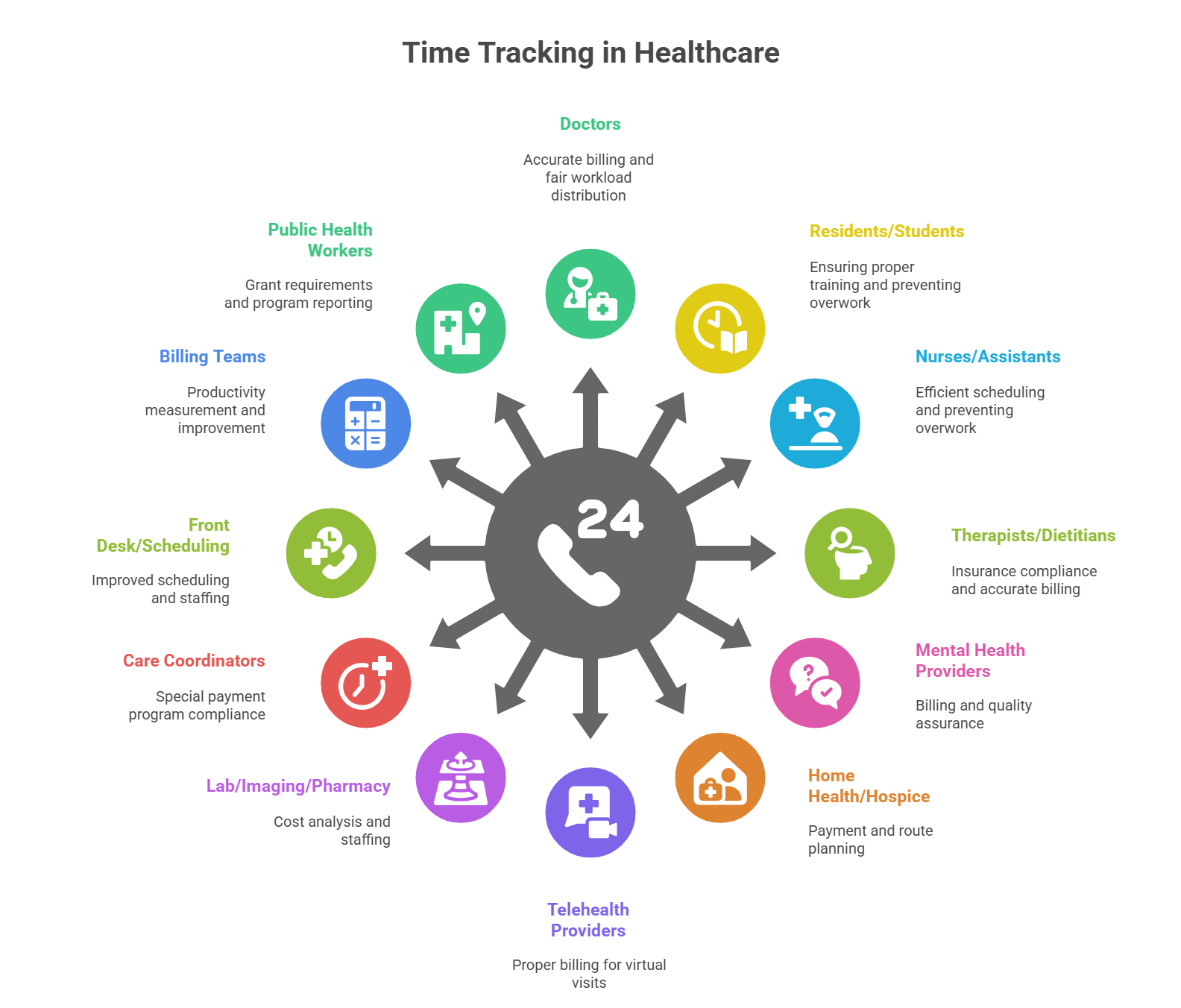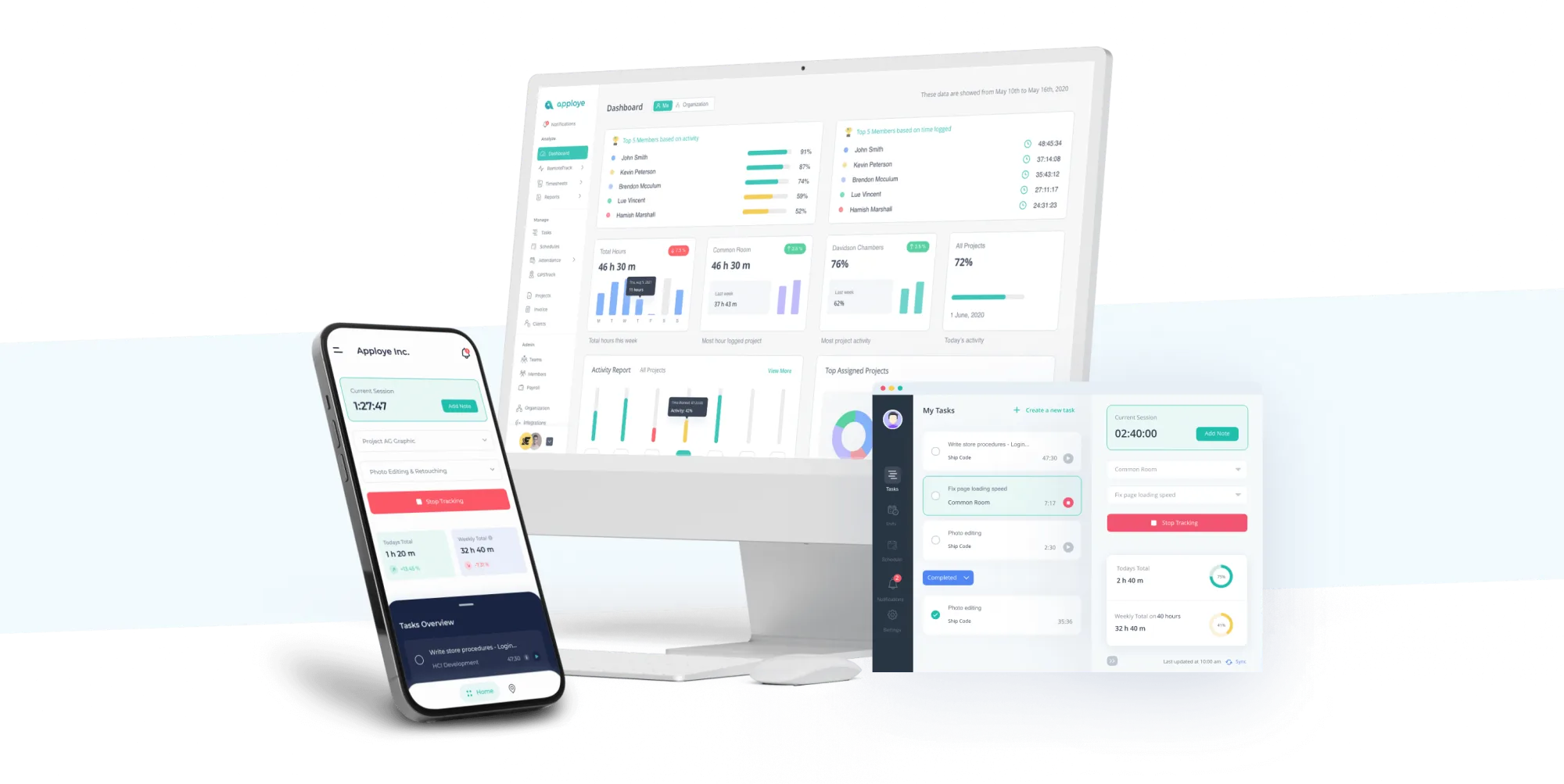Time Tracking for Medical and Healthcare Employees: Boost Efficiency & Compliance

We all get 24 hours, but in healthcare, those hours vanish fast. Doctors and nurses deal with urgent matters, paperwork, and repeatedly scheduled shifts. Moreover, they usually do not take any breaks. Here, time is much more important than money because it decides whether someone will live or die.
Because of this, monitoring the time spent on tasks is necessary. The best time-tracking tools make arranging schedules faster, pay correctly, and support compliance. Above all, healthcare workers feel less stressed without cutting down on patient support.
Who Needs Time Tracking in Healthcare?

Here's who needs to track their time in healthcare and why it's important:
- Doctors (all types): They track time spent with patients, doing procedures, and writing notes. This tracks billable hours accurately and ensures their workload is fair.
- Residents and Medical Students: They have to log their hours to make sure they're not working too much and getting proper training.
- Nurses and Nursing Assistants: They track when their shifts start and end, break times, and how much time they spend directly caring for patients. This helps with scheduling and prevents overwork.
- Therapists (Physical, Occupational, Speech, Respiratory) and Dietitians: They need to document exactly how long they spend treating patients because insurance companies require it for payment.
- Mental Health Providers (Psychologists, Counselors, Social Workers): They track how long therapy sessions last and the time spent on paperwork for billing and quality checks.
- Home Health and Hospice Workers: They log visit times and travel time between patients for payment and to plan better routes.
- Telehealth Providers: They track video call times and prep work for virtual visits to bill properly.
- Lab, Imaging, and Pharmacy Staff: They time different tasks to figure out costs and make sure they have enough staff.
- Care Coordinators: They track time spent managing patient care for special payment programs.
- Front Desk and Scheduling Staff: They monitor how long patient check-ins take to improve scheduling and staffing.
- Billing Teams: They track how long it takes to process claims to measure productivity and find ways to improve.
- Public Health Workers: They record time at clinics and community events for grant requirements and program reporting.
Track all roles with one comprehensive solution
Why Time Tracking is Crucial in Healthcare Industries
The Complexity of Healthcare Staffing
Hospitals and clinics run 24/7, which means staffing rarely takes breaks. On top of that, demand is rarely predictable. One day might be slow, and the next a flood of patients. Even the best scheduling tools can’t forecast every scenario.
These unpredictable patterns contribute directly to burnout. Long shifts, limited breaks, and emotional strain affect the whole team and the quality of patient care.
That’s why more professionals are demanding work-life balance. The old model of “you work when the schedule says” isn’t working anymore. Now, employee preferences have become part of the equation.
But balancing those preferences with operational needs isn’t easy. This is where float pools, per diem staff, and travel nurses come in. These roles offer much-needed adaptability. It helps hospitals respond to sudden changes without overwhelming their core team.
Simplify complex schedules with smart features
Impact on Payroll and Labor Compliance
Inaccurate logs mean incorrect paychecks, which directly impact employee satisfaction and trust. Beyond delayed payments, the bigger issue is how those errors affect overtime calculations. If missed overtime goes unchecked for months, it leads to lump-sum payouts and angry staff.
This may bring you to the risk of FLSA violations. The Department of Labor doesn’t accept “system glitch” as an excuse. If your process can’t stand up to an audit, it’s a liability waiting to happen.
Things get even more complicated when union rules come into play. Union contracts are detailed and often rigid. Shift differentials, mandatory breaks, and premium pay rules are non-negotiable. If your system can’t handle these specifics, you’re violating the contract.
Payroll and Taxes for Remote Employees
Ensure payroll compliance automatically today
Common Challenges in Medical Time Tracking
Manual Tracking and Its Drawbacks
Paper timesheets and punch cards may seem convenient, but they come with many drawbacks. One of the most common issues is time theft, often in the form of “buddy punching.” This happens when an employee clocks in or out on behalf of a coworker.
If one staff member doesn’t do their duties, others might have to work harder to complete the unfinished work. There may be a gradual rise in resentment, which brings down team morale.
Healthcare professionals often work long hours under intense pressure. If breaks aren't properly recorded or skipped entirely, it comes with serious legal risks. Many jurisdictions require employers to provide and track rest periods. If not, they could face penalties, lawsuits, or labor violations.
Missed breaks can also lead to claims for unpaid breaks or workers’ compensation. When staff are consistently denied proper rest, the risk of fatigue-related errors or injuries increases.
Switch to automated digital tracking systems
Lack of Integration With HR and Payroll Systems
The lack of seamless integration between HR and payroll platforms makes basic administrative tasks slow and prone to error.
This disconnection often results in double data entry. Teams are forced to reconcile data between HR and payroll, like verifying names, dates, and compensation. Mismatches in employee records can lead to incorrect paychecks. It can also lead to inaccurate calculations or missed deductions.
Beyond payroll accuracy, compliance becomes a major concern. The healthcare industry must adhere to strict labor laws, tax regulations, and licensing requirements. Without integrated systems, critical updates may be missed. This makes it harder to maintain compliance.
Get seamless HR and payroll already built in
Mobile and Remote Staff Challenges
There are many operational challenges for home health aides and field nurses working on remote teams. Most of their work happens alone with patients in their homes, so it is hard to watch their routine closely.
Moreover, the absence of real-time systems can create confusion and impact the quality of care. Navigation is another daily challenge. Staff visit multiple homes across different areas. In that case, generic GPS apps often cause delays due to incorrect addresses or traffic congestion.
Safety concerns are also significant. Without GPS-based tracking, it's difficult to confirm staff arrivals, visit durations, or departures. This lack of visibility affects both accountability and staff safety.
Enable mobile tracking for all remote teams
What Features to Look For in Healthcare Time Tracking Software
HIPAA & FLSA Compliance
For a healthcare software program, built-in compliance with laws is necessary. HIPAA contains strong encryption, limits who can access the database, and keeps track of everyone’s actions. They protect Protected Health Information and adhere to privacy policies.
For FLSA compliance, the software should offer accurate break and overtime tracking, time-off management, and scheduling tools. Payroll integration ensures precise wage calculations and timely payments.
Shift Scheduling and Real-Time Updates
Efficient shift scheduling is a must in healthcare. It ensures proper staffing, avoids overworked employees, and maintains coverage. A strong system balances shift distribution so no one feels overwhelmed or overlooked. Some tools even automate schedules based on availability, skillset, or requested time off.
But shifts change, often at the last minute. That’s why real-time updates matter. Look for software that manages time off, allows easy shift swaps, and sends updates immediately. It saves time, stress, and miscommunication.
Biometric or App-Based Clock-in Options
Healthcare employees are usually allowed to clock in using kiosks or mobile applications. A kiosk is a fixed machine that ensures access is secure by scanning fingerprints or faces. Because of this approach, there is better compliance with labor laws since employees present their IDs in person.
In addition, employees can use mobile apps to clock in no matter where they are physically. GPS and geofencing meet the needs of remote workers and the fast-paced healthcare sector. Mobile clock-ins are convenient and accessible on personal mobile devices.
Integration with Payroll & EHR Systems
Healthcare time-tracking software needs to connect with payroll and EHR systems. It makes the operation system easier and fewer expensive errors are avoided. It makes data central, merging different departments and encouraging them to speak to each other.
Automated time tracking and payroll processes guarantee staff get the payments they deserve, improving their moods. EHR integration allows for accurate tracking of patient care time, so managers gain clear knowledge.
Top Time Tracking Tool for Medical Employees
Apploye Free Time Tracking and Employee Monitoring Software

Here's why Apploye is a great time-tracking tool for healthcare teams like clinics, hospitals, home health, and labs:
Easy Time Tracking for Shift Workers
Medical staff can start timers automatically or manually. The timesheet app shows their work hours daily, weekly, or monthly. Plus, they can add notes about shift changes, handovers, or on-call time. There's even a break timer built in.
Simple Attendance Tracking that Meets Compliance Rules
Hospital managers can see exactly when medical employees clock in and out. They can review any manual changes and approve timesheets. This makes it easy to track overtime, night shift pay, or temp staff hours for audits.
Handles Payroll and Billing Automatically
Your timesheets flow straight into payroll and client billing. So, if you're providing private nursing services or therapy sessions, it reduces paperwork and mistakes.
Optional Monitoring for Sensitive Work
Along with time tracking, Apploye is also an employee monitoring software. So, for teams working remotely (like medical coders or billing staff), the app monitors employee screens and tracks online activities. But this is totally optional. You can turn it on or off for different roles.
Great Reports and Budget Tracking
You can set budgets for different departments and track costs. Get alerts when you're going over budget. This works well for specific units like radiology or the ER to keep an eye on staffing costs.
Works on the Devices Your Team Already Uses
There are desktop apps and a Chrome extension. Medical staff can track time from nurse stations, shared computers, or wherever they normally work.
Built for Healthcare
Apploye understands the unique challenges healthcare teams face. For example, shift fatigue and the need for accuracy. They have specific guides for medical teams.
Connects with Other Tools
It works with project management tools like Asana, ClickUp, and Trello that many healthcare back-office teams use for things like IT projects or quality improvement work.
Start efficient time tracking for your team
Conclusion: Bringing Efficiency and Compliance to Healthcare Staff
Time tracking in healthcare boosts operational efficiency, reduces burnout, and improves visibility for both staff and administrators. Automating time and pay processes minimizes paperwork and errors. With industry-specific software, teams gain flexibility, track time, prevent overwork, and manage time off in one place.
Frequently Asked Questions About Time Tracking for Medical and Healthcare Employees
What is a good and inexpensive way to track employee hours in the medical industry?
Medical industries can use tools like Apploye, TimeCamp, and TrackingTime PRO to keep track of time. Some of these services are free or moderately priced.
What software do healthcare companies use for scheduling/shift management?
Shifting and scheduling are made easier by healthcare companies using Apploye. It is the best time tracking for medical and healthcare employees. It makes it easy to manage staff hours, monitor employee time, and distribute workers to needed departments.
How does VMS technology revolutionize workforce management in healthcare?
With VMS (Vendor Management System) technology, workforce management in healthcare becomes more efficient. Such as staffing, onboarding, and credentialing are all improved. It allows facilities to use contingent workers efficiently, spend less, and understand what’s happening now through real-time insights.
How do employers monitor their employees' work hours when they work remotely?
Employers monitor remote employees’ work hours using comprehensive time-tracking solutions, website, and app usage monitors, and sometimes screen or keystroke tracking. Many also use project management platforms to track task progress and overall productivity.
How does healthcare workforce management improve efficiency and productivity?
Healthcare workforce management improves efficiency and productivity by automating tasks, optimizing staff schedules, and using data to forecast needs. This helps healthcare organizations better allocate resources, reduce staff shortages, and minimize turnover.
What advantages can healthcare organizations gain from implementing HRMS systems?
HRMS systems streamline HR tasks like payroll and scheduling. This improves employee management and ensures better regulator compliance with regulations. It also provides valuable data insights to support smarter decision-making.
Which pharmacy uses employee productivity monitoring tech?
Several large pharmacy chains, including Walmart and other major retailers, use employee productivity monitoring technology. These systems track activities like time with patients and prescription processing to help improve efficiency and performance.
Do employees object when hospitals implement a clock-in and clock-out policy?
Yes, some employees, especially in healthcare, may object to clock-in and clock-out policies. These policies can feel like a loss of autonomy or trust, particularly in roles where staff often work beyond scheduled hours. However, automatic time tracking helps ensure fair pay and compliance with labor laws.